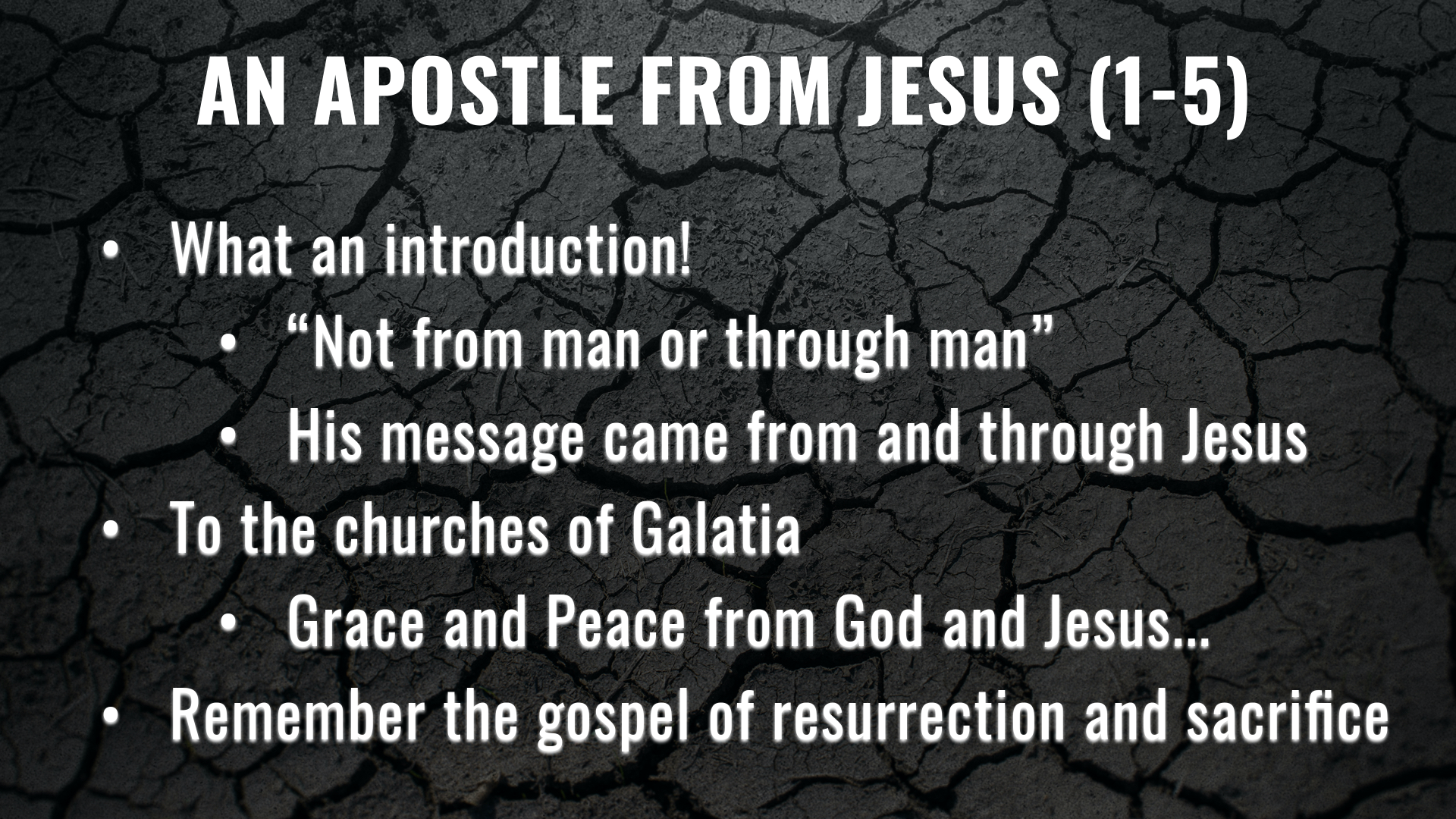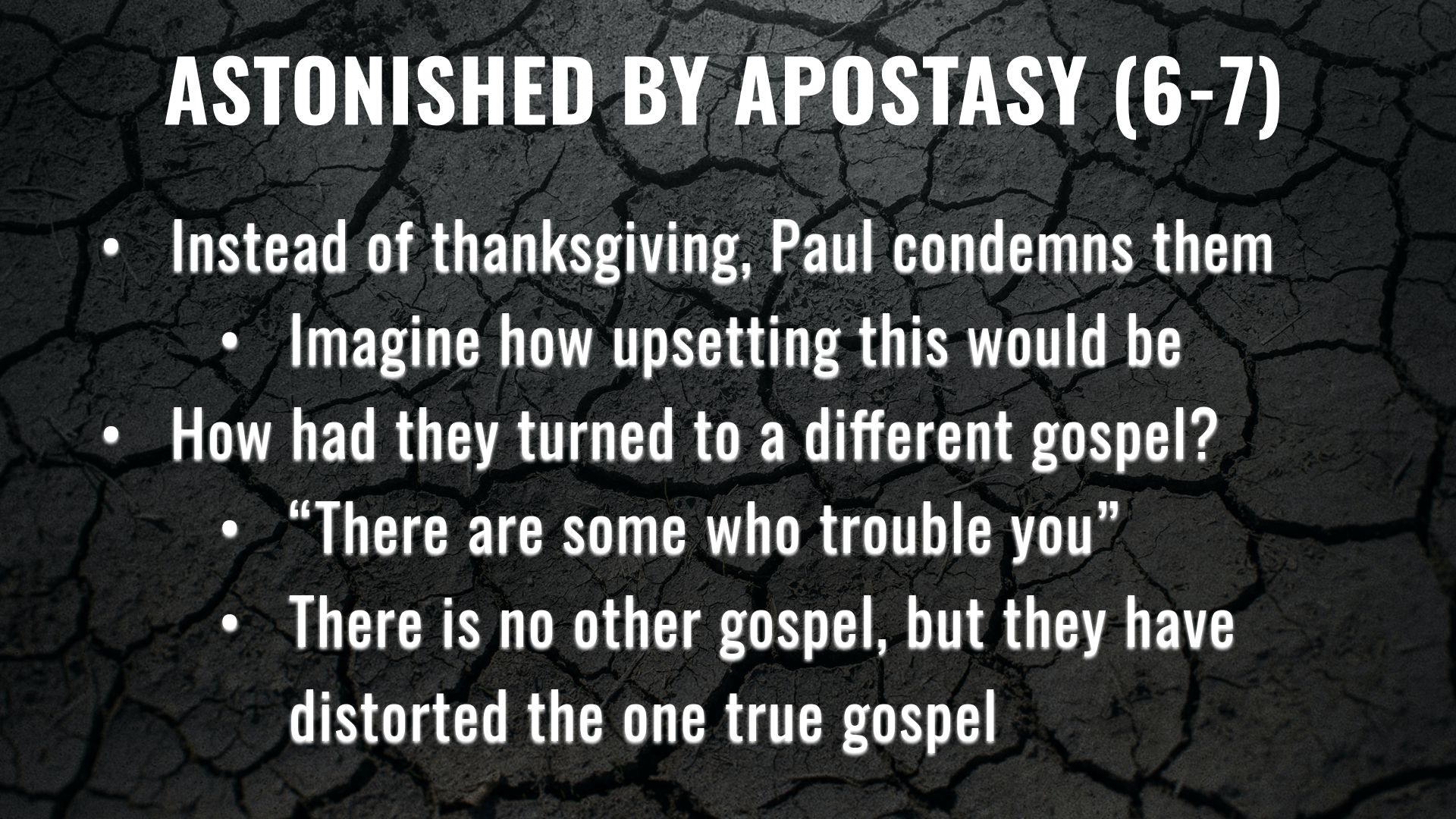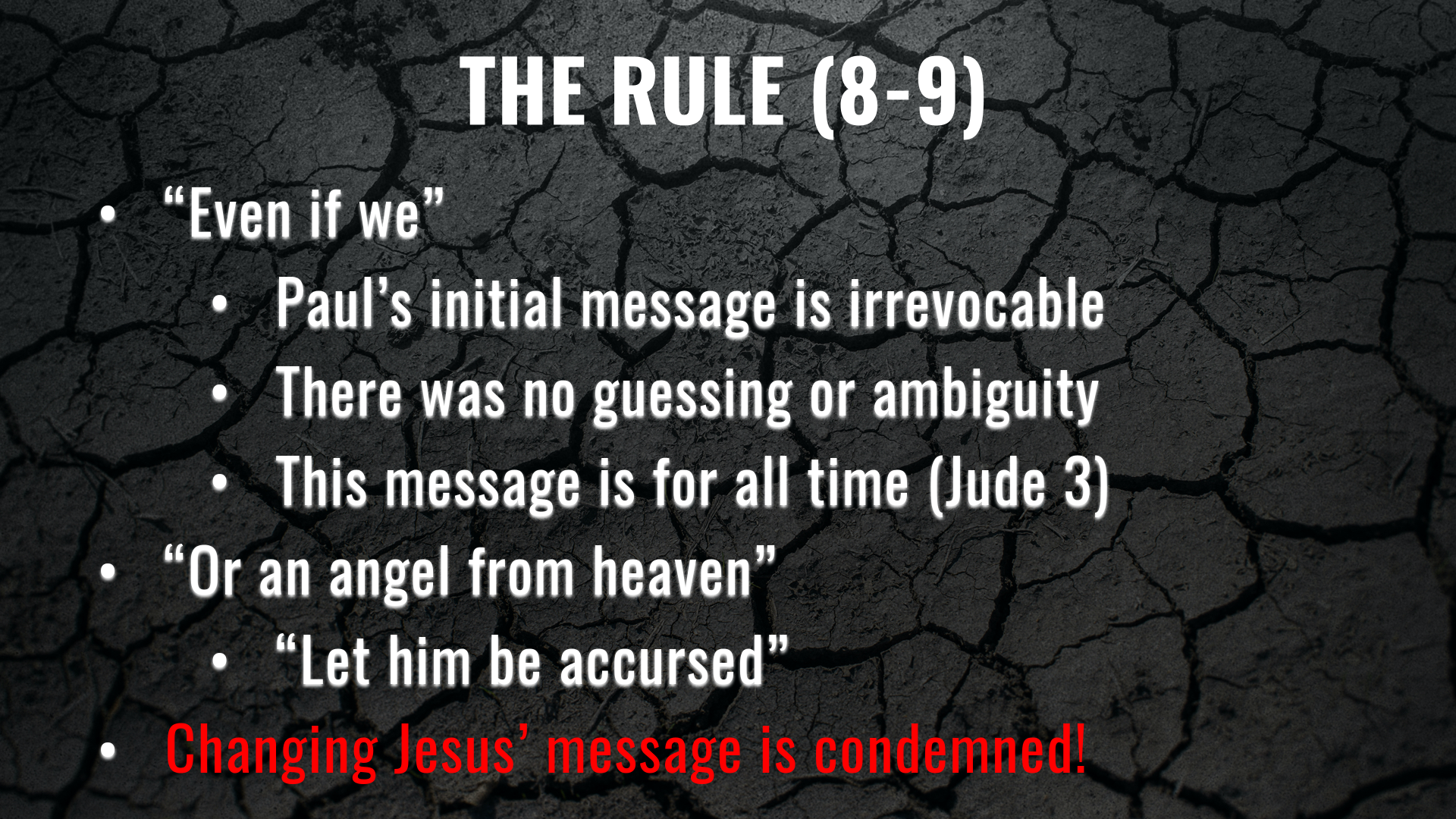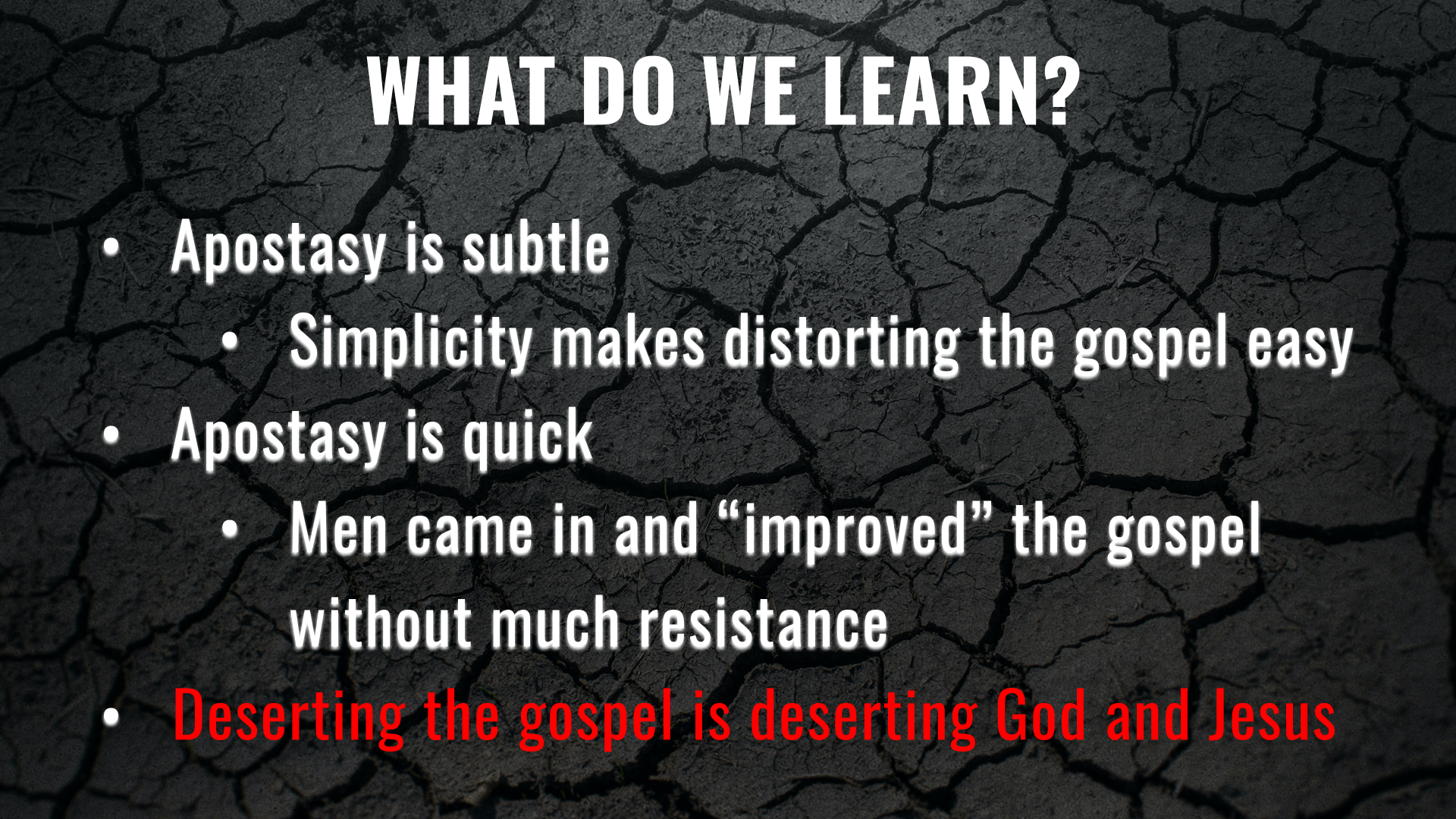Deserting Him Who Called You (Galatians 1:1-9)
But maybe there are so many different doctrines because we start reading books about the Bible instead of reading the Bible for ourselves. Although it might be good to learn other people's points of view, we would spend the best use of time understanding what the scriptures say for ourselves. With that purpose in mind, I propose we study Paul's letter to the Galatians over the next few months, and I want you to study with me. I hope you will take some time out of your week to read through this book and understand every section before I preach on it. Make that your Sunday afternoon pre-nap reading.
Before we begin, I want us to read the text that I think is the crucial idea in the book. We will work our way up to it over the next few months.
Galatians 5:1 (ESV) --- 1 For freedom Christ has set us free; stand firm therefore, and do not submit again to a yoke of slavery.
This is the truth. It is the good news and the point of the letter. Because Christ wanted to make us free, he did. Now, we must remain free. We will see what this means in our study of this great book. I hope you can be here for it.
An Apostle From Jesus (1:1-5)
Today we will begin with the first nine verses. Let's read them together.
Galatians 1:1--5 (ESV) --- 1 Paul, an apostle---not from men nor through man, but through Jesus Christ and God the Father, who raised him from the dead--- 2 and all the brothers who are with me, To the churches of Galatia: 3 Grace to you and peace from God our Father and the Lord Jesus Christ, 4 who gave himself for our sins to deliver us from the present evil age, according to the will of our God and Father, 5 to whom be the glory forever and ever. Amen.
What an introduction to a letter!
The first two verses introduce the writer as "Paul, an apostle." But he adds a little qualification to that title. He is not an apostle from men nor through men. An apostle is someone who is sent on behalf of a master. There were many apostles in the first century, but only thirteen were sent directly from Jesus and God. Paul claims that he is one of them in the book's first words.
Then, he says he is writing to the churches of Galatia. These are churches that Paul helped establish on his first missionary journey. He tells them that he wishes for God to give them grace and peace.
Overall, the first five verses of the letter sound kind enough, but verse six is a significant turning point.
Astonished By Apostasy (1:6-7)
Galatians 1:6--7 (ESV) --- 6 I am astonished that you are so quickly deserting him who called you in the grace of Christ and are turning to a different gospel--- 7 not that there is another one, but there are some who trouble you and want to distort the gospel of Christ.
In verse six, Paul should be starting his thanksgiving section. He should be gushing about how he thanks God when he prays for them because they are full of faith, hope, and love. But, instead, Paul jars them awake. Imagine how upsetting it would be to hear, "I am astonished that you are so quickly deserting him who called you." If we were in the congregation at that time, we might have asked for that to be reread. Surely, that's not right. I don't imagine anyone in the churches of Galatia believed that they were deserting God. What is Paul talking about?
At the end of verse six, he says they have turned to a different gospel. Then, he gives a side note in verse seven. He says, "Not that there is another one, but there are some who trouble you and want to distort the gospel of Christ." Now we see why Paul is so bothered. There are some among the churches of Galatia who have decided to trouble the Christians there. They have made the good news of Christ into something distorted and troubling. The good news is supposed to provide grace and peace, but instead, they are preaching something that is disrupting their faith in the message Paul preached to them at the beginning.
As we study this book together, we will make it our aim to understand what they are teaching and ensure that we don't follow their example.
The Rule (1:8-9)
Verses eight & nine are no less strong than six and seven.
Galatians 1:8--9 (ESV) --- 8 But even if we or an angel from heaven should preach to you a gospel contrary to the one we preached to you, let him be accursed. 9 As we have said before, so now I say again: If anyone is preaching to you a gospel contrary to the one you received, let him be accursed.
Paul says, "Even if we." It doesn't matter if Paul himself comes and tries to change the initially preached gospel. No one can come in and take away the good news that Paul initially told to them. He permits them to believe in the things that Paul originally preached forever. That shows the certainty Paul has in his original message. There was no guessing or ambiguity. The gospel that he first preached has been once and for all time delivered for those who are willing to accept it. Now all they have to do is hold on to it.
He says that it doesn't even matter if an angel comes down and tries to tell them something different. It doesn't matter if a man named Joseph Smith has an angel come and give him golden plates or a woman named Ellen G White gets a message from God. It doesn't matter if an organization that makes billions of dollars a year comes and tells you they know when the end of the world will be. If what they say does not conform with the scriptures, it is not valid, and they deserve to be cursed or condemned for spreading such lies! Don't listen and don't believe their false gospels.
What Do We Learn?
Apostasy is subtle. It is something that happens without us even noticing. These Christians had believed Paul at the beginning. They were taught everything they needed to know and submitted to the truth. But now, they have wandered off into something that doesn't align with the truth. Paul restates those truths in verses one and four. He says, "God the Father, who raised him from the dead" and "The Lord Jesus Christ who gave himself for our sins to deliver us from the present evil age." Each of these sayings retells the gospel message. It's so simple, but troublemakers have easily distorted this good news, and a new form of the gospel was presented to them by "qualified men."
Paul said that he was astonished or amazed at how quickly they were deserting him who called them. Notice the second idea from this text. Apostasy can be quick. It doesn't take long for us to forget why we believed what we used to believe, question all that we have heard, and accept a new doctrine or idea presented convincingly. Also, consider how much weight we give to the proper credentials and significant backing. Paul says that he is an apostle through Jesus Christ and God the Father. His initial message was directly from God and is infallible. Even if he wanted to change it, he couldn't. How quickly are we persuaded when the majority is persuaded around us?
I find it interesting that Paul says they have deserted, not the gospel but him who called you in the grace of Christ. They have deserted the Holy Spirit, Jesus, and God who called them to this tremendous salvation. But notice that they were still religious. They still looked like the church Paul had helped establish from a worship and activity standpoint. But we will see the fruit of that apostasy over time. It is subtle and quick.
Application
So, where does your understanding of the gospel come from? Is your understanding derived from some gospel men came up with, or is it based on the actual truth given to us in the Bible? If it's from men, you have not believed in Christ. If you believed the gospel of God but have been convinced by someone with angelic qualities, you have deserted God. Also, we find that teaching a gospel contrary to Paul's initial gospel is worthy of being accursed or condemnation.
I have made this text the foundation of my truth-seeking, and I think you should too. Knowing that apostasy is subtle and quick means that we must see the simple truth of the gospel and hold on to it more tightly than ever. Think about the two points of the gospel that Paul gives in verses one and four, the resurrection of Christ and the sacrifice of Christ.
Surely, today troublemakers would not easily convince us that Jesus wasn't raised from the dead. But our world is working hard through science to dispute all claims of miraculous activity. There is a shaming and mockery that exists in the world around us. We have to come to terms with that and be ready to stand on the actual truth found in scripture. According to a survey in 2017 done in Britain, only 57% of active Christians asked said that they believe the resurrection happened as the Bible describes it. In 1 Corinthians 15, we see that Christians in Corinth were also fighting against this false doctrine that Jesus was not raised from the dead. Society is trying to pull us away from this belief, but it is fundamental. Deserting this truth means deserting God. We must hold on to it.
The second part of the gospel revolves around the sacrifice of Christ for our sins. This part is more easily distorted. I think I have fallen into this trap. If someone comes along and tells us that we must sacrifice ourselves to be delivered from the present darkness, would we see that as a subtle apostasy? Would we be quickly persuaded that we must save ourselves? This touches on the slavery and freedom aspect that is the key to this letter.
Conclusion
When we study the New Testament to find the truth for ourselves, it becomes evident that today's teachings are not in step with the truth. The gospel is not a Calvinistic "once saved, always saved" teaching. The gospel does not allow modern prophets to come in and reveal a different truth. The gospel is not that the church will save you. Men cannot save you, and you cannot save yourself. The gospel is that Jesus died for our forgiveness, was resurrected, and lives in heaven as king. Hold on to that truth, and let it defeat the many false religions of our day.






